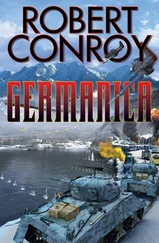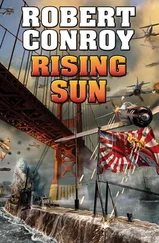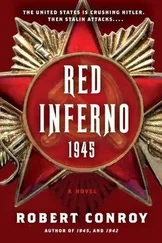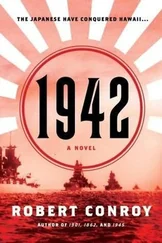Robert Conroy - North Reich
Здесь есть возможность читать онлайн «Robert Conroy - North Reich» весь текст электронной книги совершенно бесплатно (целиком полную версию без сокращений). В некоторых случаях можно слушать аудио, скачать через торрент в формате fb2 и присутствует краткое содержание. Год выпуска: 2012, Жанр: Альтернативная история, на английском языке. Описание произведения, (предисловие) а так же отзывы посетителей доступны на портале библиотеки ЛибКат.
- Название:North Reich
- Автор:
- Жанр:
- Год:2012
- ISBN:нет данных
- Рейтинг книги:4 / 5. Голосов: 1
-
Избранное:Добавить в избранное
- Отзывы:
-
Ваша оценка:
- 80
- 1
- 2
- 3
- 4
- 5
North Reich: краткое содержание, описание и аннотация
Предлагаем к чтению аннотацию, описание, краткое содержание или предисловие (зависит от того, что написал сам автор книги «North Reich»). Если вы не нашли необходимую информацию о книге — напишите в комментариях, мы постараемся отыскать её.
North Reich — читать онлайн бесплатно полную книгу (весь текст) целиком
Ниже представлен текст книги, разбитый по страницам. Система сохранения места последней прочитанной страницы, позволяет с удобством читать онлайн бесплатно книгу «North Reich», без необходимости каждый раз заново искать на чём Вы остановились. Поставьте закладку, и сможете в любой момент перейти на страницу, на которой закончили чтение.
Интервал:
Закладка:
“I hate this part,” Truscott said softly.
“Tell me about it, general,” Canfield whispered.
Grant looked about and shook his head sadly. “It’s even worse the farther back you go. We were packed in so closely in the rear it was almost impossible for German shells to miss hitting something.”
Truscott looked away and Grant said nothing more. His comment was an implicit criticism of their previous commander. In his consuming fear of a German counter assault, he had left them utterly unprepared for one when it occurred. Nothing more, however, would be said about the past. Truscott’s plans were for the future.
“How soon can your men begin moving out and attacking the krauts?” he asked Canfield who showed no surprise at the request.
“Anytime you want, general. It would be nice if we got some food, ammunition, and some replacements. I can do without the replacements but we are almost out of ammo and an army does move on its stomach.”
Truscott smiled. He had been getting the same response from all his front line commanders. The army was pissed off and wanted to strike back. The battle had started poorly, but they had prevailed over the Germans and it felt good.
“You’ll get your supplies in the next couple of hours and you can move out then. Slowly, of course, we don’t want anyone stepping into an ambush and, oh yeah, look out for mines. The pricks have a million of them, or so we’ve heard. We’ll start sending you replacements right off so you can start filtering them in.”
Grant looked away. The new guys would have a hard time fitting in with a unit that had been intact for so long and had just been savaged. Nobody would want to make friends with someone who might be dead in an instant. Another face of war, he thought. The Germans had to have been hit just as badly. However, they didn’t have a deep well of reinforcements and replacements from which to draw, which was just too fucking bad, he thought.
“Can we contain them?” Guderian asked.
He was referring to the attempts by the U.S. Army to cross the Niagara to their south.
“So far, yes,” replied General Steiner, commander of the South Front. He looked exhausted, as did Guderian. “They have crossed at two points and are trying to build pontoon bridges. As soon as one gets partly built, either our guns or our planes knock it down. This cannot last forever. They are wearing us down with their greater numbers of men, guns, and planes. That and when their beachhead expands will force us to give up the defensive line along the Niagara River and retreat northward. I would strongly recommend making plans to begin that phase of the battle as soon as possible.”
Guderian rubbed his eyes. He would not have referred to a retreat as a ‘phase of the battle.’ They were planning to retreat, not only from the river, but from General Raus’s West Front as well. Patton’s continuous pressure on German defenses was slowly destroying them. Raus needed to pull his men back to shorter and more defensible positions.
Of course, the Fuhrer had expressly forbidden that. His orders were that Fortress North Reich would remain intact and be defended to the last. At least Berlin had stopped insulting him with promises of great numbers of reinforcements coming after the Kriegsmarine swept the seas of American and British ships. The German navy would never defeat the Allies; that much was abundantly clear.
Guderian took a sip of schnapps that someone on his staff had liberated from a liquor outlet in St. Catharines. He winced. It was inexpensive and probably locally made, nothing like what he’d enjoyed back in Germany. He wondered if he would ever get to enjoy anything back in Germany.
He sensed someone in front of him and looked up. “Koenig, you look like hell.”
“I feel that way, sir. My car was strafed on the way back and my driver was killed. He was also my radioman and that meant I couldn’t keep in touch.”
“Are you hurt?”
“Cuts and bruises, sir. Nothing that a few months leave in Berlin or the south of France wouldn’t cure.”
Guderian laughed softly. He would give a year’s pay to be back in Germany with his wife Margarete and their two sons, both of whom were in the army. He hoped they were not fighting in that snake pit called Russia.
But seeing his family was not going to happen. He was not going home anytime in the foreseeable future. He had the North Reich to defend, and now had very little to defend it with.
General George C. Marshall dreaded his next appointment. If he could, he would have palmed the man off on one of his staffers, but one does not insult the Secretary of the Treasury.
Henry Morgenthau was a Jew, which was unusual as few Jews rose to positions of prominence in the federal government. He’d been born in the U.S. and succeeded in the world of business. He was also a friend and upper New York neighbor of FDR and that was another reason to see the man, even though the meeting was doubtless going to be fruitless and frustrating. Morgenthau wanted that which did not and could not exist — safety and freedom for his fellow Jews in Europe.
From all that Marshall could ascertain, Morgenthau had worn the mantle of Jewishness lightly for almost all of his life. Apparently he rarely, if ever, observed the Sabbath or went to a synagogue. He’d been what some people referred to as an assimilated Jew, if, Marshall thought, any Jew could be assimilated in a mainly Protestant American environment. He’d gone to excellent schools, and if his faith denied him entrance into certain clubs and neighborhoods, and even a number of restaurants, he didn’t seem at all bothered by the slights. It was a small price to pay to participate in the American dream.
All of this changed when Morgenthau realized the full fury of the horror that was occurring in the Third Reich. Like anyone with knowledge of the barbarism, he’d been sickened and stunned by the systematic slaughter of Jews under Hitler and Himmler. It had changed him and he was now a rabid Zionist, and a man compelled to try and save what remained of the Jews of Europe.
Unfortunately, Morgenthau’s was a hopeless quest.
The two men shook hands and took seats. No one else was present in the general’s office. “I assume you know why I am here,” Morgenthau began without preamble.
“Of course. You want me to somehow come up with a military solution to save the Jews of Europe. My question has to be why haven’t you discussed this with the president?”
Morgenthau laughed bitterly. “Because the president won’t speak of it. He defers, delays, and obfuscates. He will not give me an answer.”
Marshall fully understood. He too had been the beneficiary of FDRs maddening habit of never giving a straight answer. “Mr. Secretary, I will be blunt. There is no military solution at this time, nor is there likely to be one for quite some time. We know that the main death camp is called Birkenau and it is outside the city of Auschwitz. Auschwitz itself is about fifty miles west of Krakow and very close to the old German border. As you are doubtless aware, it used to be the Polish town of Oswiecim until it was annexed by Germany and re-named. It is deep in the middle of Europe and untouchable.”
“You could bomb it,” Morgenthau said with a hint of desperation that made Marshall uncomfortable.
“Auschwitz is eight hundred and fifty miles from London and, yes, a B17 could fly there and back. However, we have no forces in England. Even if we did, the bombers would have to fly much of the way without shorter range escorts and they would be slaughtered by the Luftwaffe. Despite the propaganda, the so-called Flying Fortress is far from invulnerable. And, if the bombers actually did make it to Auschwitz, they would have a devil of a time finding either the city or the camp as Polish maps are worse than primitive and aircraft navigation is still a rough science. Are you aware that our planes flying from New York State sometimes can’t find Toronto and that some German planes flying from Europe couldn’t find London?”
Читать дальшеИнтервал:
Закладка:
Похожие книги на «North Reich»
Представляем Вашему вниманию похожие книги на «North Reich» списком для выбора. Мы отобрали схожую по названию и смыслу литературу в надежде предоставить читателям больше вариантов отыскать новые, интересные, ещё непрочитанные произведения.
Обсуждение, отзывы о книге «North Reich» и просто собственные мнения читателей. Оставьте ваши комментарии, напишите, что Вы думаете о произведении, его смысле или главных героях. Укажите что конкретно понравилось, а что нет, и почему Вы так считаете.












